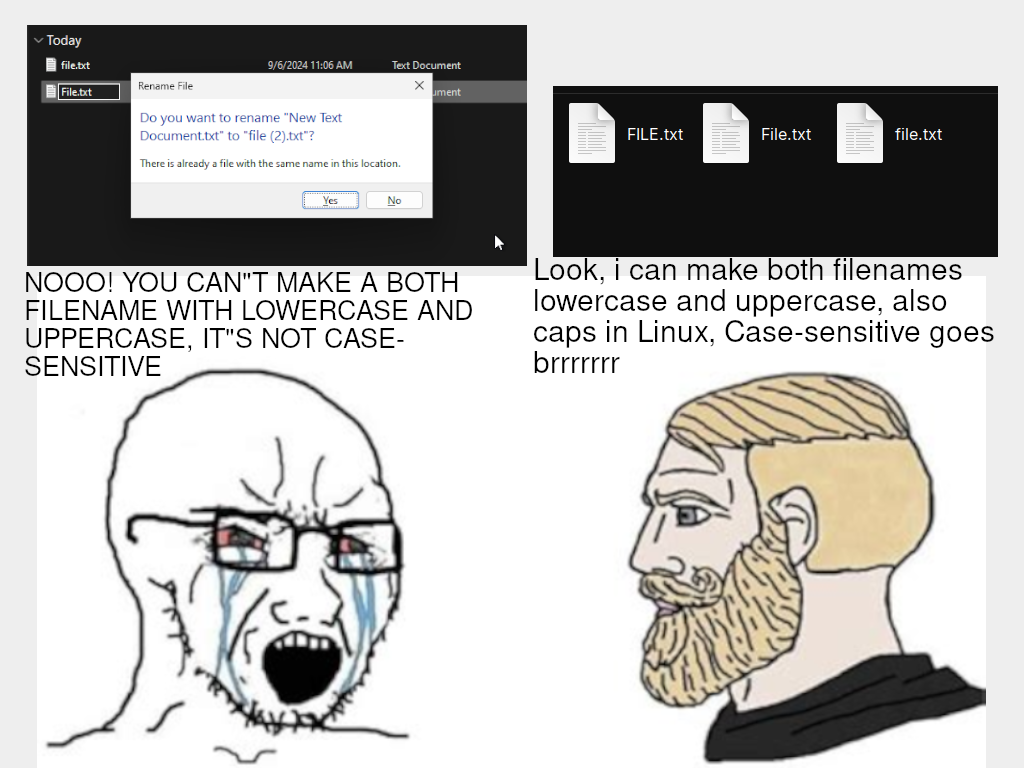this post was submitted on 06 Sep 2024
614 points (90.4% liked)
linuxmemes
21926 readers
2033 users here now
Hint: :q!
Sister communities:
Community rules (click to expand)
1. Follow the site-wide rules
- Instance-wide TOS: https://legal.lemmy.world/tos/
- Lemmy code of conduct: https://join-lemmy.org/docs/code_of_conduct.html
2. Be civil
- Understand the difference between a joke and an insult.
- Do not harrass or attack users for any reason. This includes using blanket terms, like "every user of thing".
- Don't get baited into back-and-forth insults. We are not animals.
- Leave remarks of "peasantry" to the PCMR community. If you dislike an OS/service/application, attack the thing you dislike, not the individuals who use it. Some people may not have a choice.
- Bigotry will not be tolerated.
- These rules are somewhat loosened when the subject is a public figure. Still, do not attack their person or incite harrassment.
3. Post Linux-related content
- Including Unix and BSD.
- Non-Linux content is acceptable as long as it makes a reference to Linux. For example, the poorly made mockery of
sudoin Windows. - No porn. Even if you watch it on a Linux machine.
4. No recent reposts
- Everybody uses Arch btw, can't quit Vim, <loves/tolerates/hates> systemd, and wants to interject for a moment. You can stop now.
5. 🇬🇧 Language/язык/Sprache
- This is primarily an English-speaking community. 🇬🇧🇦🇺🇺🇸
- Comments written in other languages are allowed.
- The substance of a post should be comprehensible for people who only speak English.
- Titles and post bodies written in other languages will be allowed, but only as long as the above rule is observed.
Please report posts and comments that break these rules!
Important: never execute code or follow advice that you don't understand or can't verify, especially here. The word of the day is credibility. This is a meme community -- even the most helpful comments might just be shitposts that can damage your system. Be aware, be smart, don't remove France.
founded 2 years ago
MODERATORS
you are viewing a single comment's thread
view the rest of the comments
view the rest of the comments

It is not. It is designed for all purposes, automated processes and people alike. A filesystem is not just for grandma's Word documents.
And even people's names are case sensitive. My name has the format Aaa Bbb ccc Ddd. It is not the same as the person with the name Aaa Bbb Ccc Ddd, who also exists. So why shouldn't file names be?
Imagine a table in a database where the primary key is a case sensitive character field, because you know varchars, just like C char types and string types in other languages are case sensitive.
Imagine a database administrator does the following:
Imagine a second database adminstrator around the same time does the following:
Now imagine this is the GDPR data of two different users.
If you have a case insensitive file system, you've just overwritten something you shouldn't have and possibly even leaked confidential data.
If you have a case sensitive file system you don't have to account for this scenario. If the PK is unique, the filename will be unique, end of story.
If you don't do something stupid like reuse keys just with different capitalization, this never occurs.
The point is you have to take this into account, so the decision to go with a case insensitive file system has ripple effects much further down your system. You have to design around it at every step in code where a string variable results in a file being written to or read from.
It's much more elegant if you can simply assume that a particular string will 1-on-1 match with a unique filename.
Even Microsoft understands this btw, their Azure Blob Storage system is case sensitive. The only reason NTFS isn't (by default) is because of legacy. It had to be compatible with all uppercase 8.3 filenames from DOS/FAT16.